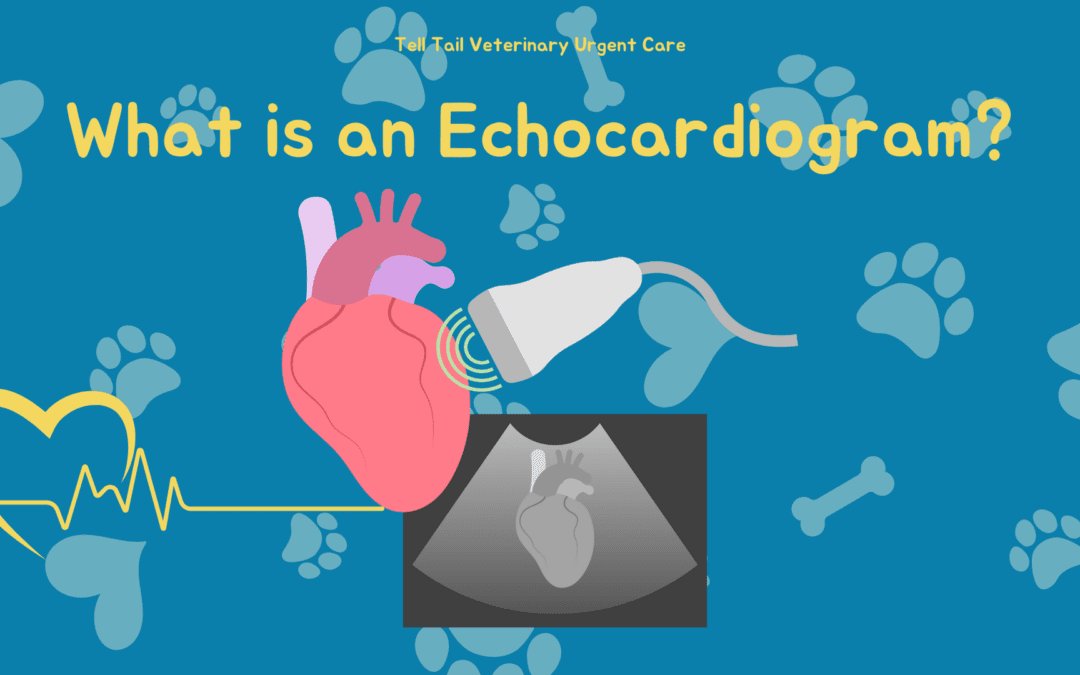When it comes to your pet’s health, their heart is as important as yours. Just like humans, pets can suffer from heart conditions that may affect their quality of life. Whether your pet is getting older or has been showing symptoms like coughing, lethargy, or difficulty breathing, an echocardiogram can help. At Tell Tail Veterinary Urgent Care in San Diego, we offer in-house echocardiograms to quickly diagnose and manage heart disease, screen for genetic conditions, and ensure your pet’s safety during anesthesia—especially for senior pets.
What is an Echocardiogram?
An echocardiogram, or “echo,” is an ultrasound of the heart that allows veterinarians to visualize the heart’s structures and functions in real-time. By using sound waves, an echocardiogram provides detailed images of the heart’s chambers, valves, walls, and blood flow. Unlike X-rays, which show the heart’s shape and size, an echocardiogram allows us to see how well your pet’s heart is functioning.
Why is an Echocardiogram Important for Pets?
There are many reasons your pet might need an echocardiogram. Whether it’s for routine health screening or the management of a known condition, this diagnostic tool provides critical insights into your pet’s heart health.
1. Diagnosing and Managing Heart Disease
Pets, particularly older cats and dogs, are prone to developing heart disease. Symptoms can be subtle, but if left untreated, heart disease can significantly impact your pet’s health. Common symptoms include:
- Coughing
- Difficulty breathing
- Fatigue or weakness
- Fainting spells
- Sudden collapse
An echocardiogram helps veterinarians detect and monitor heart conditions like congestive heart failure, cardiomyopathy (a disease of the heart muscle), and valve problems. With an echocardiogram, we can tailor treatments to manage your pet’s condition, often improving their quality of life.
2. Screening for Heart Masses
Echocardiograms can also help detect heart masses, such as tumors or abnormal growths in or around the heart. Early detection is key to managing these masses and determining the best course of action, whether it’s medical management, surgery, or monitoring.
3. Genetic Screening for Heart Conditions
Certain breeds of dogs and cats are predisposed to heart disease due to genetic factors. For example, Cavalier King Charles Spaniels are known for developing mitral valve disease, while Maine Coon cats are more likely to suffer from hypertrophic cardiomyopathy (a thickening of the heart muscle).
Echocardiograms are an essential screening tool for these breeds, allowing veterinarians to detect heart problems early—even before symptoms appear. Catching these conditions early can lead to better outcomes and help guide preventive care.
4. Ensuring Safe Anesthesia for Senior Pets
As our pets age, their risk for heart disease increases. If your senior pet requires surgery, an echocardiogram can assess whether their heart is strong enough to handle anesthesia. This is especially important for older pets or those who have a history of heart murmurs or other heart issues. By screening for any underlying heart conditions, we can adjust anesthesia protocols to keep your pet safe during surgery.
When Should Your Pet Get an Echocardiogram?
Your veterinarian may recommend an echocardiogram if your pet:
- Has a heart murmur
- Shows symptoms of heart disease (e.g., coughing, fatigue)
- Belongs to a breed with a higher risk of heart disease
- Needs pre-anesthetic screening, especially for senior pets
- Has a known heart condition that requires monitoring
At Tell Tail Veterinary Urgent Care, we can perform echocardiograms right here in our San Diego clinic. This allows for rapid diagnosis and treatment, so you don’t have to wait for answers about your pet’s health.
What to Expect During Your Pet’s Echocardiogram
An echocardiogram is a non-invasive and painless procedure. During the exam, your pet will lie comfortably while the veterinarian uses an ultrasound probe to capture images of the heart. In most cases, sedation isn’t required, but in anxious pets, mild sedation may be used to keep them calm and still.
The procedure typically takes around 60 minutes, depending on your pet’s condition. Afterward, our veterinary team will transmit the images and information to a veterinary Cardiologist. The veterinary cardiac specialist will review and provide a full written report with findings and any recommendations. This report will be shared with your primary veterinarian who can follow up with a treatment plan.
The Benefits of Echocardiograms at Tell Tail Veterinary Urgent Care
By offering in-house echocardiograms at Tell Tail Veterinary Urgent Care you can avoid long wait times for an appointment, giving you peace of mind. Whether your pet is experiencing heart-related symptoms or simply needs a pre-surgery screening, we’re here to help.
Our experienced veterinary team uses state-of-the-art ultrasound technology to assess your pet’s heart health and provide the best care possible. Located conveniently in San Diego, we welcome walk-ins for urgent concerns and are ready to assist your pet with immediate diagnostic testing.
Conclusion
Your pet’s heart health is essential to their overall well-being, and an echocardiogram is a powerful tool for diagnosing and managing heart disease. Whether you’re monitoring an existing condition or screening for potential risks, an echo can give you valuable insights into your pet’s health. At Tell Tail Veterinary Urgent Care, we’re proud to offer in-house echocardiograms, so you can get quick, accurate results and start your pet on the path to better health.
If you have any concerns about your pet’s heart health, or if you need pre-surgical screening for your senior pet, contact us at 619-282-8035, email us, or walk-in today to speak with one of our experienced veterinarians.


